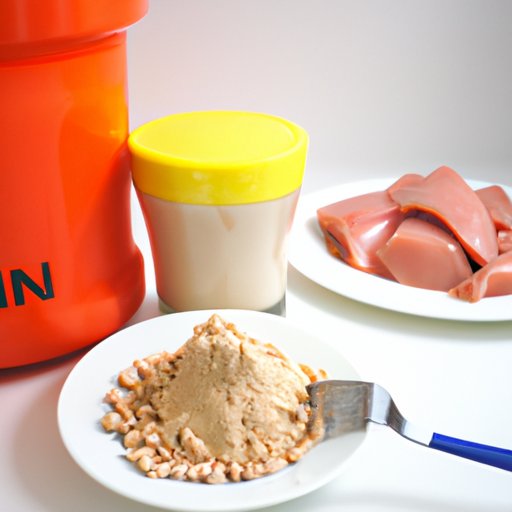Introduction
Protein is one of the three macronutrients found in food, along with carbohydrates and fats. It’s an essential part of any healthy diet, as it helps build and repair tissue, makes hormones and enzymes, and produces energy. When it comes to weight loss, protein can play an important role in helping you reach your goals. But how much protein should you eat to lose weight?
How Much Protein Do You Need to Lose Weight?
The recommended daily intake of protein for weight loss is 0.8-1.2 grams of protein per kilogram of body weight (or 0.36-0.54 grams per pound). For someone who weighs 150 pounds, that would be 54-81 grams of protein per day. However, this recommendation is just a starting point, and there are several factors to consider when determining how much protein you should eat. These include your age, gender, activity level, and weight loss goals.
The Role of Protein in Weight Loss
Different types of proteins can have different effects on weight loss. Animal proteins such as meat, eggs, and dairy are considered complete proteins, meaning they contain all nine essential amino acids. Plant proteins such as beans, nuts, and grains are incomplete proteins, as they do not contain all nine essential amino acids. Both animal and plant proteins can help with weight loss, but animal proteins may be more effective due to their higher biological value.
In addition to providing essential amino acids, protein can also boost metabolism, reduce appetite, and decrease cravings. Studies have shown that high-protein diets can lead to greater fat loss and preservation of muscle mass compared to low-protein diets. Research also suggests that protein-rich meals can help increase satiety and reduce calorie intake throughout the day.

Achieving Maximum Weight Loss with the Right Amount of Protein
To maximize the benefits of protein for weight loss, it’s important to incorporate the right amount into your diet. Here are some tips for increasing your daily protein intake:
- Replace some of the carbohydrates in your diet with lean sources of protein, such as chicken, fish, eggs, and Greek yogurt.
- Add a scoop of protein powder to your smoothies or oatmeal.
- Snack on high-protein foods such as nuts, seeds, nut butter, or hard-boiled eggs.
- Make sure you’re getting enough iron and other micronutrients from protein-rich foods.
When choosing your sources of protein, it’s important to select lean options whenever possible. This means avoiding processed meats, full-fat dairy products, and saturated fats. Focus on lean proteins such as skinless chicken, fish, turkey, egg whites, legumes, nuts, and seeds. It’s also important to get enough fiber, vitamins, and minerals from your protein sources, so try to include a variety of whole foods in your diet.

Exploring the Benefits of Protein for Weight Loss
In addition to aiding in weight loss, higher protein diets can offer a number of other health benefits. A study published in the American Journal of Clinical Nutrition found that people who ate a higher protein diet had lower levels of inflammation, improved blood sugar control, and reduced risk of cardiovascular disease. Another study published in the British Journal of Nutrition found that people who ate a higher protein diet reported greater feelings of fullness after meals and had better overall dietary adherence.
However, it’s important to note that higher protein diets can also have potential drawbacks. Excess protein can put stress on the kidneys and lead to dehydration, constipation, and other digestive issues. Additionally, people who eat a lot of animal proteins may be at risk for high cholesterol and increased cancer risk. Therefore, it’s important to speak with a doctor or registered dietitian before making any major changes to your diet.
Conclusion
Protein can be an effective tool for weight loss, but it’s important to get the right amount. The recommended daily intake of protein for weight loss is 0.8-1.2 grams of protein per kilogram of body weight (or 0.36-0.54 grams per pound). Aim to incorporate a variety of lean protein sources into your diet, such as skinless chicken, fish, turkey, egg whites, legumes, nuts, and seeds. Higher protein diets can offer a number of health benefits, but it’s important to speak with a doctor or registered dietitian before making any major changes to your diet.
(Note: Is this article not meeting your expectations? Do you have knowledge or insights to share? Unlock new opportunities and expand your reach by joining our authors team. Click Registration to join us and share your expertise with our readers.)
